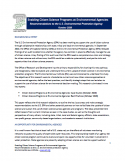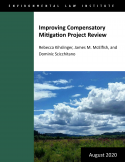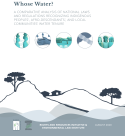
Research Reports
ELI publishes Research Reports available for free download that present the analysis and conclusions of the policy studies ELI undertakes to improve environmental law and policy. These reports contribute to education of the profession and disseminate diverse points of view and opinions to stimulate a robust and creative exchange of ideas. Those publications, which express opinions of the authors and not necessarily those of the Institute, its Board of Directors, or funding organizations, exemplify ELI’s commitment to dialogue with all sectors.
This paper outlines key issue areas and makes strategic recommendations to the U.S. EPA and their partners on how to facilitate the uptake of citizen science and sustain its use across state, tribal and local environmental agencies and their programs.
Read More >
Inuit are at the forefront of the drastic changes taking place in the Arctic. As the world community increasingly turns its focus to the Arctic, it is important to ensure that Inuit Food Sovereignty is a priority in every context. Western management systems overlaid on top of traditional Inuit practices often take a different approach, sometimes grounded in historical discrimination.
Read More >The goal of this project was to equip advocates for nature-based solutions with information to play an active role in the hazard mitigation planning process by 1) identifying best practices in inclusion of nature-based strategies in local hazard mitigation plans in the Gulf Coast region, and 2) providing a schedule indicating which entities prepare these plans and a timeline for their next update.
Read More >
Healthy wetlands benefit our environment and economy in a number of ways, from providing habitat to wildlife and fisheries, to improving water quality, to offering opportunities for recreation.
Read More >
Clearly defined and legally secure freshwater tenure rights are essential to Indigenous Peoples’ and local communities’ livelihoods and food security, as well as to countries’ efforts to achieve sustainable development priorities and ensure climate resilience. However, the extent of the legal recognition of these rights to water remains largely unknown and unmonitored.
Read More >